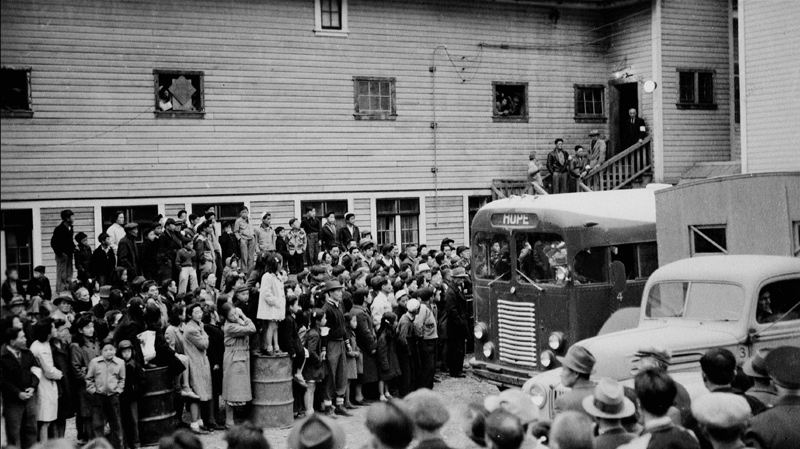B.C. commits $100 million to Japanese Canadians in recognition of internment history
 Japanese-Canadians gather inside an internment camp during the Second World War in this undated image. (National Archives of Canada / THE CANADIAN PRESS)
Japanese-Canadians gather inside an internment camp during the Second World War in this undated image. (National Archives of Canada / THE CANADIAN PRESS)
British Columbia is giving $100 million in funding to address the historical wrongs it caused when it helped to intern thousands of Japanese Canadians during the Second World War.
The announcement comes on the 80th anniversary of the first arrivals of Japanese Canadians to the Greenwood, Kaslo, New Denver, Slocan City and Sandon internment camps in 1942.
Premier John Horgan says funds will go toward providing updated health programs for internment survivors, the creation and restoration of heritage sites and updating the provincial curriculum to include what he calls a “terrible chapter” in B.C.'s history.
Horgan says the recognition is “long overdue” and the funding symbolizes “turning a page” in how Japanese Canadians have been treated by past governments.
The province says in a statement that this builds on a 2012 apology by the B.C. Legislature and responds to a redress proposal advanced in 2021 by the National Association of Japanese Canadians.
B.C. also gave $2 million to the Nikkei Seniors Health Care and Housing Society last May as a first step toward fulfilling a promise to recognize the internment of almost 22,000 people.
“This endowment will not change the past, but it will ensure that generations that are with us still, and those that come after, will have the opportunity to see something positive coming out of what was clearly a very, very dark period in our collective histories,” Horgan said at a Saturday news conference.
This report by The Canadian Press was first published May 21, 2022.
CTVNews.ca Top Stories

Widow looking for answers after Quebec man dies in Texas Ironman competition
The widow of a Quebec man who died competing in an Ironman competition is looking for answers.
Tom Mulcair: Park littered with trash after 'pilot project' is perfect symbol of Trudeau governance
Former NDP leader Tom Mulcair says that what's happening now in a trash-littered federal park in Quebec is a perfect metaphor for how the Trudeau government runs things.
World seeing near breakdown of international law amid wars in Gaza and Ukraine, Amnesty says
The world is seeing a near breakdown of international law amid flagrant rule-breaking in Gaza and Ukraine, multiplying armed conflicts, the rise of authoritarianism and huge rights violations in Sudan, Ethiopia and Myanmar, Amnesty International warned Wednesday as it published its annual report.
Photographer alleges he was forced to watch Megan Thee Stallion have sex and was unfairly fired
A photographer who worked for Megan Thee Stallion said in a lawsuit filed Tuesday that he was forced to watch her have sex, was unfairly fired soon after and was abused as her employee.
Amid concerns over 'collateral damage' Trudeau, Freeland defend capital gains tax change
Facing pushback from physicians and businesspeople over the coming increase to the capital gains inclusion rate, Prime Minister Justin Trudeau and his deputy Chrystia Freeland are standing by their plan to target Canada's highest earners.
U.S. Senate passes bill forcing TikTok's parent company to sell or face ban, sends to Biden for signature
The Senate passed legislation Tuesday that would force TikTok's China-based parent company to sell the social media platform under the threat of a ban, a contentious move by U.S. lawmakers that's expected to face legal challenges.
Wildfire southwest of Peace River spurs evacuation order
People living near a wildfire burning about 15 kilometres southwest of Peace River are being told to evacuate their homes.
U.S. Senate overwhelmingly passes aid for Ukraine, Israel and Taiwan with big bipartisan vote
The U.S. Senate has passed US$95 billion in war aid to Ukraine, Israel and Taiwan, sending the legislation to President Joe Biden after months of delays and contentious debate over how involved the United States should be in foreign wars.
'My stomach dropped': Winnipeg man speaks out after being criminally harassed following single online date
A Winnipeg man said a single date gone wrong led to years of criminal harassment, false arrests, stress and depression.
































